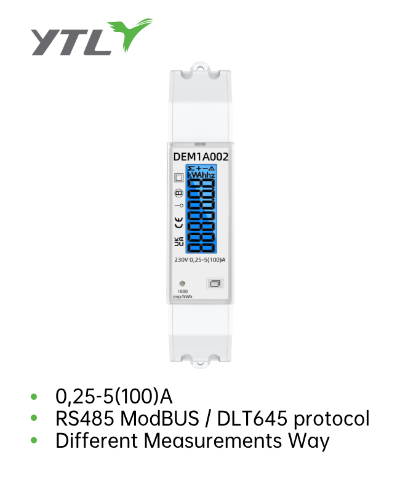 A digital energy meter is a device used to measure the amount of electrical energy consumed by a residential or commercial building. It is an essential tool for monitoring and managing energy usage, as it provides accurate and real-time data on electricity consumption.
A digital energy meter is a device used to measure the amount of electrical energy consumed by a residential or commercial building. It is an essential tool for monitoring and managing energy usage, as it provides accurate and real-time data on electricity consumption.
The digital energy meter is equipped with advanced technology that allows it to measure energy usage with high precision. It can record energy consumption in kilowatt-hours (kWh) and display the data in a digital format, making it easy for users to read and understand. Some digital energy meters also have the capability to store historical energy usage data, which can be used for analysis and comparison.
One of the key features of a digital energy meter is its ability to communicate with other devices and systems. Many modern digital energy meters are equipped with advanced communication protocols, such as Modbus or DNP3, which allow them to transmit energy usage data to a central monitoring system. This enables building managers and utility companies to remotely monitor and manage energy usage, result to more efficient energy management and cost savings.
In addition to measuring energy consumption, digital energy meters may also have the ability to monitor power quality. They can detect and record voltage fluctuations, power factor, and other electrical parameters that can affect the efficiency and reliability of the electrical system. This information is valuable for identifying and addressing power quality issues, which can help improve the overall performance of the electrical system.
Another important function of a digital energy meter is its ability to support different tariff structures. Many utility companies offer various tariff options, such as time-of-use or demand-based pricing, to encourage energy conservation and load management. A digital energy meter can be programmed to calculate energy costs based on the specific tariff structure, providing users with accurate billing information and incentives to reduce energy consumption during peak demand periods.
The implementation of digital energy meters has become increasingly common in many countries, driven by the need for more efficient and sustainable energy management. Governments and utility companies are promoting the use of digital energy meters as part of their energy efficiency and conservation initiatives. In some cases, digital energy meters are required by regulations or standards to ensure accurate measurement and billing of energy usage.
In conclusion, a digital energy meter is a sophisticated device that plays a crucial role in monitoring and managing electrical energy consumption. With its advanced technology and communication capabilities, it provides users with accurate and real-time data on energy usage, supporting more efficient and sustainable energy management practices. As the demand for energy conservation and efficiency continues to grow, the use of digital energy meters is expected to become more widespread. This will contribute to a greener and more sustainable future.

 English
English 简体中文
简体中文







.png?imageView2/2/w/500/h/500/format/png/q/100)






